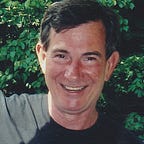Ancient Egyptians Believed We All Die Twice — They Almost Got It Right!
The Ancient Egyptians believed we all die twice. First, when we take our last breath. Second, when our name is spoken for the last time. Their thinking was ahead of its time — they just got the ending wrong.
Despite her Greek lineage and defeat by Rome, Cleopatra may lead in the name recognition game among Egypt’s ancient elite. I suspect the Nile Queen’s second life has more to do with her made for the movies romance with Mark Antony than with her prowess as a leader.
Pharaoh Khufu (who?) must be rolling in his crypt, wondering why he bothered building the Great Pyramid. His name might not be as memorable, but he can take solace in the pile of postcards featuring his pointy tomb and its contribution to more than a million people employed in his country’s tourism industry.
Fast forward a few thousand years, and other big names roll off the tongue; Beethoven and Elvis, Pasteur and Hawking, Abraham and Buddha. But is it only about the name? No, we speak in reverence to the impact of their achievements on culture, science, and spirituality. It’s the life behind the name that counts.
In her funeral poem, The Dash, Linda Ellis speaks of “the dates on the tombstone, from the beginning …to the end.” but “what mattered most of all was the dash between those years.” To Ellis, that lone character, etched in stone between birth and death, symbolizes the full life of the beloved — the hard work and accomplishments, the joys and sadness, the loves and regrets.
Our Egyptian friends might argue for appending a Second Dash to recognize our afterlives of remembrance. And rightly so. For proof, we need only look at the ongoing impact of inventions like the light bulb, medicines like insulin, and artworks like the Mona Lisa — all created by souls long since passed.
Famous people and their monumental achievements come readily to mind, but what about the rest of us, plodding along in unremarkable lives? Will we be remembered? Can we influence the future through our meager lives? Most of us are lucky if they say our name for a few generations. Do you know the name of your Great, Great Grandfather?
A friend recently expressed his doubts, “I’m just a mosquito flying around in the swamp. Nothing I do will ever make a difference.” His feelings of impotence are understandable. With almost 8 billion humans on the planet, it’s easy to feel powerless. But, like many of us, he underestimates his potential.
Yes, we learn the teachings of Jesus and Mohammad, but can we name the scribes who carried their message to the world? We remember Isaac Newton discovering gravity after seeing an apple fall, but do we remember who planted the tree? Our simple lives vibrate with potential, like the fisherman who feeds the teacher, who inspires the student, who becomes a doctor, and cures a disease.
Physicists describe the ‘butterfly effect’ as a butterfly flapping its wings in Mexico, causing a tornado in Texas. The fact that no one can link a flapper to a twister only emphasizes that for chaotic systems like the weather, or humanity, small actions add up. We may not see the chain of possibilities, but they are real.
Our first lives are a brief clap where we get the chance to leave an echo of ourselves beyond our death. Like the multitude of un-named stones in Khufu’s pyramid, our afterlives knit together to form the foundation upon which future generations are built.
What we do is what we become. We need to build on the gifts we are given and pass them forward. None of us is perfect, but we can strive to live with grace and love and hope that, on the scales of destiny, the good we have done outweighs the bad.
So, how accurate were the ancient Egyptians? Well, part of us does live on after our last breath. And, they got the name thing right. What they missed is that our second lives keep sailing long after we disappear over the horizon. And, at our journey’s end, hopefully, we arrive together at a worthy destination.
If you enjoyed this story, give me a clap, a share, send a response, or follow me on Medium. Let’s continue our journey of learning together!
Here’s another story you might find worthwhile: Fall in Love with a Leaf
